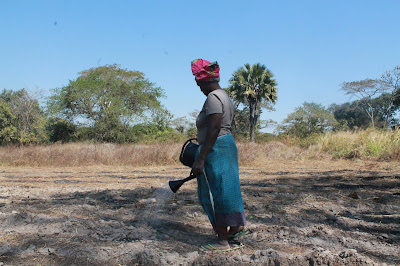 |
| "Women are key actors within the food system," (Kirk, et al.,September 2018) |
Zambia’s agricultural sector is dominated by maize. About
two thirds of cropped area is covered by the crop.Furthermore, maize production is largely dependent on rainfall making it vulnerable to changes in the weather patterns.
“Of the 1.5 million smallholders in Zambia, an estimated 89%
grew maize in 2015 (CSO, et al.2016). Fewer than 80% of smallholder farmers cultivate three or fewer crops. The practice of crop diversification is still significantly low regardless of the visible effects of climate change and existing poor nutrition levels.
On August 22nd, Hivos People Limited launched a discussion paper entitled Beyond Maize: Exploring agricultural
diversification in Zambia from different perspectives.
The study which was
presented in a meeting attracted stakeholders from various agricultural
backgrounds and brought to light a number of pertinent factors that are stalling the progress of
diversification.
Some of these factors included market demand and market
access. It is commonly said, by the Ministry of Agriculture, that farming is a
business and so farmers’ decisions on what to grow are largely influenced by what
consumers on the market are willing to pay for.
“Farmers will grow anything that has market …and maize has
market,” Dr. Frank Kayula - president of the National Union for Small-scale
Farmers of Zambia – pointed at during the meeting.
His sentiments were
supported by Henry Malumo, pioneer of the Produce Zambian campaign who
added that, “Consumer engagement is critical in addressing issues of agricultural
diversification.”
“There is a relationship between farmers and traders which
influences what farmers are growing,” said Lameck Kashiwa who is General
Secretary for the Alliance for Zambian Informal Economy Associations.
In addition to those observations, one interesting fact worth noting from the discussion paper
was that “anecdotal evidence suggests that men tend to focus on maize
production and other cash crops; and are not as inclined as women to produce
other crops, particularly legumes,” (Mofya-Mukuka & Hichaambwa.2016)
Given that agricultural diversification is significantly dependent on dietary diversification, it is disturbing to note that the primary caregivers and chief nutritionists of the home were not given a leading role in efforts to diversify agriculture.
"The high control of men over agricultural income in Zambia could partly explain the current low levels of dietary diversification,"(Mofya-Mukuka & Sambo.2018)
Elizabeth Lifumbo is a small-scale farmer who was privileged
to participate in the Beyond Maize discussion. She too is a practical example of how crop diversification even on a small scale can enable household food security and income. She was among the few icons of the farming community present who was able to testify of the benefits of crop diversification from her 3 acre farm in
Mapepe, Chilanga.
“The one advantage of growing different crops is that there
is always something to eat in my home,” Ms. Lifumbo said. The challenge she
experienced, however, was access to seed other than maize.
“Most of us farmers are willing to grow a wider variety of crops but
seed is difficult to find and those which are readily available such as groundnuts
are quite expensive,” she added.
Ms. Lifumbo also highlighted the weak bargaining power of rural farmers - especially women farmers - who are compelled to sell their crops at a price controlled by traders therefore making them reluctant to diversify their production further.
Deliberate efforts need to be stepped up to strengthen food markets for rural farmers especially women, by aggressively meeting their demand for inputs other than maize and enhancing their access to market.
Empowering women to be active participants int he transformation of the agricultural secotr will inevitably improve nutrition and rural household incomes.




No comments:
Post a Comment